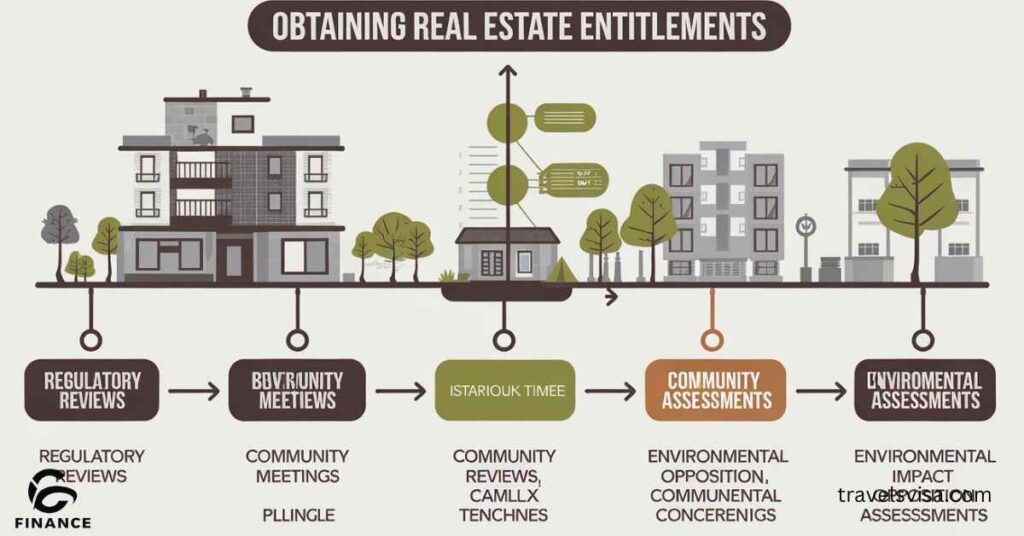In the ever-evolving world of real estate development, understanding the intricacies of entitlements is crucial for success. This comprehensive guide delves into the complex realm of real estate entitlements, offering insights and strategies for developers, investors, and property owners navigating this essential aspect of the industry in 2024.
What Are Real Estate Entitlements?
Real estate entitlements encompass a wide range of permissions and approvals necessary for developing or modifying a property. These can include zoning laws, building permits, and various other regulatory clearances. Essentially, entitlements define the legal framework within which a property can be developed or utilized.
The scope of entitlements can vary significantly depending on the jurisdiction and the nature of the proposed development. For instance, a simple home renovation might require only basic permits, while a large-scale commercial development could necessitate a complex array of entitlements, including environmental assessments, traffic studies, and community impact analyses.
The Significance of Entitlements in Property Development
The importance of entitlements in real estate cannot be overstated. They are the gateway to realizing a property’s full potential and can significantly impact its value. Entitlements also play a crucial role in shaping the urban landscape.
Through careful community planning and the permitting process, local governments use entitlements to guide development in line with broader community goals and land development plans. This ensures that new projects contribute positively to the area’s growth and sustainability.
Steps in the Entitlement Process
The entitlement process typically begins with a thorough analysis of the property and applicable regulations. This often involves conducting site surveys and reviewing zoning laws to determine what is currently allowed on the property. Developers then create detailed plans for their proposed project, which are submitted to the relevant local authorities for review.
Once submitted, the plans go through various stages of review and approval. This may involve presentations to planning commissions, public hearings, and negotiations with local officials. Throughout this process, developers may need to revise their plans to address concerns or comply with specific requirements.
Key Players in the Entitlement Process
The entitlement process involves a diverse group of stakeholders, each playing a crucial role in shaping the outcome. Key players typically include:
- Developers and property owners
- Local government officials and planners
- Community members and neighborhood associations
- Architects and engineers
- Legal experts specializing in real estate law
- Environmental consultants
Timeline and Costs Associated with Entitlements
The timeline for obtaining entitlements can vary dramatically depending on the project and location. Simple projects in less regulated areas might secure entitlements in a matter of months, while complex developments in heavily regulated urban centers could take several years.
Costs associated with the entitlement process can also be substantial. These may include fees for permit applications, environmental studies, legal counsel, and architectural services. Developers must carefully factor these costs and timelines into their project planning and financial projections.
Types of Real Estate Entitlements
Real estate entitlements come in various forms, each addressing specific aspects of property development and use. Understanding these different types is crucial for developers and property owners as they navigate the complex landscape of real estate development.
The specific entitlements required for a project will depend on its nature, location, and the local regulatory environment. Some projects may require multiple types of entitlements, while others might need only one or two.
Rezoning
Rezoning is a fundamental type of entitlement that involves changing the designated use of a property. This process is necessary when a proposed development doesn’t align with the current zoning of the land. For example, if a developer wants to build a commercial complex on land zoned for residential use, they would need to apply for rezoning.
The rezoning process typically involves submitting a detailed application to the local planning department, presenting the case to a planning commission, and often, engaging with the local community. Successful rezoning can significantly increase a property’s value by expanding its development potential.
Zoning Variances
Zoning variances are exceptions to existing zoning regulations. They allow property owners to use their land in a way that deviates from the standard zoning rules. Common examples include requests for increased building height, reduced setbacks, or changes in parking requirements.
Obtaining a variance often requires demonstrating that strict adherence to the zoning code would cause undue hardship and that the proposed exception won’t negatively impact the surrounding area. The process typically involves a hearing before a zoning board of appeals.
Use Permits
Use permits, also known as conditional use permits or special use permits, allow for specific uses of a property that are not automatically permitted by the zoning code but may be allowed under certain conditions. These permits are often required for businesses or activities that might have a significant impact on the surrounding area.
Examples of uses that might require a special permit include churches in residential areas, bars in commercial districts, or industrial facilities in agricultural zones. The approval process for use permits often involves public hearings and may require the applicant to meet specific conditions to mitigate potential negative impacts.
Utility Approvals
Utility permits are a crucial aspect of the entitlement process, particularly for new developments or significant renovations. These approvals ensure that a property has access to essential services like water, electricity, gas, and sewage systems. The process of obtaining utility approvals often involves working with both local government agencies and private utility companies.
Landscaping Approvals
Landscaping approvals are becoming increasingly important in many jurisdictions as part of a broader focus on environmental sustainability and aesthetic considerations. These approvals typically involve submitting detailed landscaping plans that comply with local regulations regarding issues like water conservation, native plant use, and tree preservation.
In some cases, landscaping approvals may be tied to broader environmental goals, such as reducing urban heat islands or managing stormwater runoff. Developers may need to work with landscape architects to create plans that meet both aesthetic and functional requirements.
Road Approvals
Road approvals are critical for developments that require new road construction or significant modifications to existing roads. This process ensures that new roads meet safety standards, align with local transportation plans, and can adequately handle the traffic generated by the development.
Obtaining road approvals often involves conducting traffic impact studies, working with transportation engineers, and coordinating with local transportation departments. In some cases, developers may be required to contribute to off-site road improvements to mitigate the impact of their project on the local transportation network.
Challenges in Obtaining Real Estate Entitlements

The path to securing real estate entitlements is often fraught with challenges. Developers and property owners must navigate a complex landscape of regulations, community concerns, and environmental considerations. Understanding these challenges is crucial for developing effective strategies to overcome them.
Regulatory Complexities
One of the primary challenges in obtaining real estate entitlements is navigating the intricate web of regulations that govern property development. These regulations can include zoning laws, building codes, environmental regulations, and historical preservation requirements, among others.
The regulatory landscape is often in flux, with new laws and regulations being introduced regularly. Staying up-to-date with these changes and understanding their implications for specific development projects can be a significant challenge. Developers often need to work closely with legal experts and consultants specializing in local regulations to ensure compliance.
Community Opposition
Community opposition can be a significant hurdle in the entitlement process. Local residents may have concerns about how a proposed development will impact their neighborhood, ranging from increased traffic and noise to changes in community character or property values.
Addressing community concerns often requires a delicate balance of communication, negotiation, and sometimes, compromise. Developers may need to modify their plans or include community benefits in their proposals to gain local support. Engaging with the community early and transparently can help mitigate opposition and build support for a project.
Environmental Concerns
Environmental considerations have become increasingly prominent in the entitlement process. Developers often need to conduct environmental assessments to evaluate the potential impact of their projects on local ecosystems, water resources, air quality, and wildlife habitats.
Addressing environmental concerns may require incorporating sustainable design elements, preserving natural features, or mitigating potential negative impacts. In some cases, environmental regulations may significantly limit what can be developed on a particular piece of land, potentially altering or even derailing development plans.
Strategies for Successful Entitlement Acquisition
Navigating the complex world of real estate entitlements requires a strategic approach. Successful developers and property owners employ a range of tactics to streamline the process and increase their chances of obtaining the necessary approvals. Here are some key strategies to consider:
- Thorough due diligence
- Early engagement with stakeholders
- Flexibility in project design
- Building strong relationships with local officials
- Effective community outreach
- Assembling a skilled team of experts
By implementing these strategies, developers can improve their chances of success in the entitlement process, potentially saving time and resources while achieving their development goals.
Due Diligence and Pre-planning
Thorough due diligence is the foundation of a successful entitlement process. This involves comprehensive research into the property, local regulations, and market conditions before embarking on a development project. Key aspects of due diligence include:
- Reviewing zoning laws and other relevant regulations
- Conducting site surveys and environmental assessments
- Analyzing the local real estate market and development trends
- Identifying potential challenges or obstacles early in the process
Effective pre-planning based on this due diligence can help developers anticipate and address potential issues before they become significant obstacles. This proactive approach can save time and resources in the long run.
Read This Blog: Unlocking the Potential of STR MEANING Real Estate: A Comprehensive Guide
Building Relationships with Local Authorities
Developing positive relationships with local authorities can significantly smooth the entitlement process. This involves more than just complying with regulations; it requires understanding the goals and priorities of local officials and aligning development proposals with these objectives where possible.
Strategies for building these relationships include:
- Attending local government meetings and community events
- Engaging in open and transparent communication with officials
- Demonstrating a commitment to community benefits and sustainable development
- Being responsive to feedback and willing to make reasonable adjustments to plans
By fostering good relationships with local authorities, developers can often navigate the entitlement process more efficiently and effectively.
Engaging the Community
Community engagement is crucial for gaining support for development projects and addressing potential opposition. Effective community engagement strategies include:
- Holding informational meetings to present plans and gather feedback
- Creating opportunities for community input in the design process
- Addressing concerns proactively and transparently
- Highlighting the benefits of the project for the local community
By involving the community early and meaningfully, developers can build trust and potentially reduce opposition to their projects. This can lead to smoother approvals and stronger community relationships in the long term.
The Impact of Entitlements on Real Estate Value
Entitlements play a crucial role in determining the value of real estate. Understanding this relationship is essential for developers, investors, and property owners looking to maximize the potential of their assets. The impact of entitlements on property value can be substantial, often far outweighing the costs associated with obtaining them.
Properly entitled land represents a clearer path to development, reduced risk, and increased potential for return on investment. As such, entitlements can significantly enhance the marketability and value of a property.
Also Read: Accession in Real Estate: A Comprehensive Guide to Property Rights and Value Enhancement
How Entitlements Increase Property Value
Entitlements can increase property value in several ways:
- Reduced development risk: Entitled properties have already cleared significant regulatory hurdles, making them more attractive to developers and investors.
- Increased development potential: Entitlements often allow for more intensive use of the land, potentially increasing its income-generating capacity.
- Time savings: The entitlement process can be lengthy; properties with existing entitlements offer a faster path to development.
- Clarity of use: Entitlements provide clear guidelines for what can be developed, reducing uncertainty for potential buyers or investors.
Entitlements and Real Estate Investment Strategies
Savvy real estate investors often factor entitlements into their investment strategies. Some common approaches include:
- Buying unentitled land and pursuing entitlements to increase value
- Focusing on markets with streamlined entitlement processes
- Partnering with local experts who understand the entitlement landscape
- Targeting properties with existing entitlements for faster development timelines
Understanding the entitlement process and its impact on value can open up new opportunities for real estate investment and development. However, it’s important to carefully assess the risks and potential returns associated with different entitlement strategies.
Future Trends in Real Estate Entitlements
The landscape of real estate entitlements is continuously evolving, shaped by changing regulations, technological advancements, and shifting societal priorities. Understanding these trends is crucial for developers and investors looking to stay ahead in the competitive real estate market.
As we look towards the future, several key trends are likely to impact the entitlement process and shape the development landscape in the coming years.
Sustainability and Green Building Entitlements
Sustainability is becoming an increasingly important factor in the entitlement process. Many jurisdictions are incorporating green building standards and sustainability requirements into their zoning codes and building regulations.
Future trends in this area may include:
- Increased emphasis on energy efficiency and renewable energy in building codes
- More stringent requirements for stormwater management and water conservation
- Incentives for developments that incorporate green spaces and promote biodiversity
- Requirements for climate resilience in coastal and flood-prone areas
FAQ
What happens if I develop without proper entitlements?
Developing without proper entitlements can lead to severe consequences. Local authorities may issue stop-work orders, impose hefty fines, or even require the removal of unauthorized structures. In some cases, property owners may face legal action. It’s always advisable to obtain all necessary entitlements before beginning any development work.
Can entitlements expire?
Yes, entitlements can expire. The duration of entitlements varies depending on local regulations and the specific type of entitlement. Some may be valid for a set period, often ranging from one to three years, while others might have longer durations. It’s crucial to be aware of any expiration dates and to begin development or seek extensions before entitlements lapse.
How do entitlements differ between commercial and residential properties?
While the basic process is similar, entitlements for commercial properties often involve more complex requirements than those for residential properties. Commercial developments may require more extensive traffic studies, environmental impact assessments, and public hearings. Additionally, the scale and potential community impact of commercial projects often lead to greater scrutiny in the entitlement process.
Conclusion
Entitlements play a pivotal role in shaping the landscape of real estate development. They serve as the bridge between a property’s potential and its realization, influencing everything from land value to development timelines. As the real estate industry continues to evolve, understanding and effectively navigating the entitlement process will remain a critical skill for developers, investors, and property owners alike.
The complexity of entitlements reflects the delicate balance between development needs, community interests, and environmental considerations. While the process can be challenging, it ultimately serves to ensure that development occurs in a manner that benefits both property owners and the broader community.

Howdy, editor at FinanceEon.com, brings over a decade of financial journalism experience. He ensures accuracy and insightful analysis, guiding a team on market trends and investment strategies.







